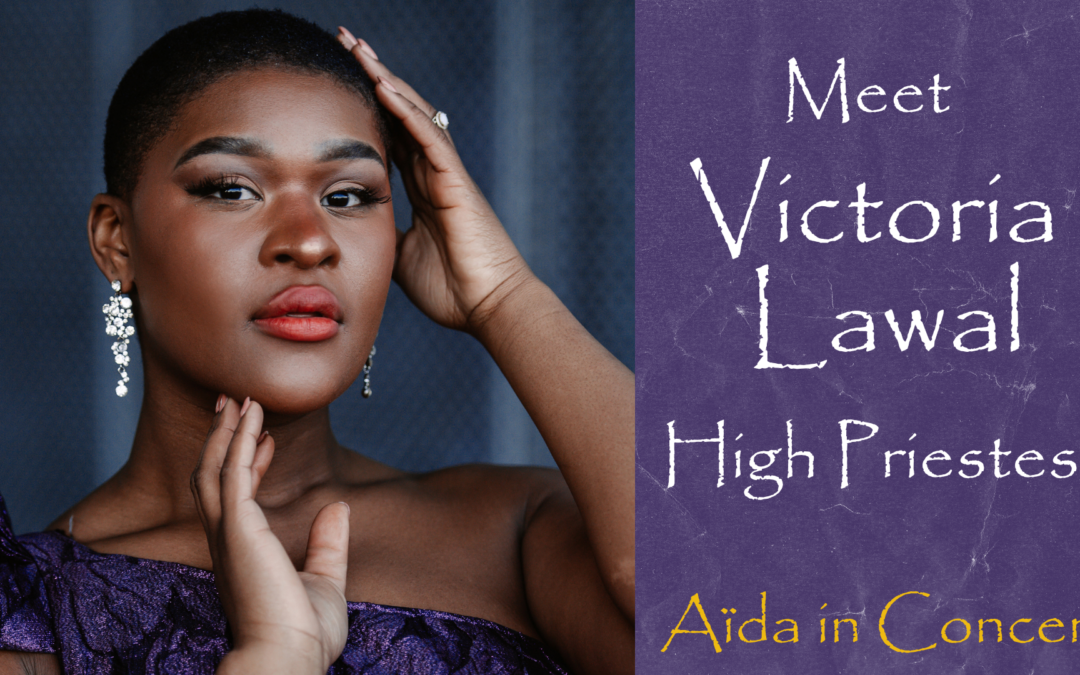Meet Victoria Lawal!
Victoria Lawal debuts the role of High Priestess in Verdi’s Aïda in Concert with Tulsa Opera this February. We had the opportunity to ask Victoria a few questions about her upcoming performance. Read more about her below!
Q: How did you get started singing? And why opera?
A: Growing up in Texas, my choral education quickly became the backbone of my musical career. I started singing in the 4th grade, when I was finally old enough to join my elementary school choir! Prior to that moment, I’d only studied dance and piano. I sang in my school choirs from then on. Eventually, in my music appreciation class, we watched Lily Pons’ iconic performance of the “Bell Song” from Lakmé. I remember saying to my choir director, “I wish I could do that“, to which he simply responded, “you can”!
From that moment on, I was completely enraptured with all things opera! I studied the entire discography of Amelita Galli-Curci, Claudia Muzio, Maria Callas and basically anything I could find with that iconic, fuschia “Lebendige Vergangenheit” album cover. If you know, you know!
In my opinion, opera is one of the greatest forms of musical expression. The vocalism is otherworldly and Herculean. The drama is visceral, regardless of whether or not you understand the text. Opera is my favorite love language!
Q: What is your favorite part or highlight from Aida that inspires you?
A: The story of Aida is as grand as it is deeply human. My favorite musical highlight in the opera has to be Radamès’ “Celeste Aida”! I am always touched by Ghislanzoni’s writing in this moment. I think there is something incredibly beautiful about loving someone so deeply and seeing beauty in everything they do. I believe the ability to love freely and proudly can be an incredible strength.
A: I believe Aida reminds us of why it is crucial to see people, even our enemies, as we see ourselves. Beautifully flawed and ever changing, we are all human. I relate this story to an excerpt from Bell Hooks Killing Rage— “Beloved community is formed not by the eradication of difference but by its affirmation, by each of us claiming the identities and cultural legacies that shape who we are and how we live in the world.”
Nigerian-American Soprano Victoria Lawal recently made house and role debuts as Musetta in La Bohème with Opera Birmingham, following a National Tour as Marzelline in Heartbeat Opera’s “Urgent, powerful, and poignant” (The New York Times) production FIDELIO.
In a return to The Glimmerglass Festival, Victoria reprised the role of Isabelle in The Passion of Mary Cardwell Dawson, by Sandra Seaton and Carlos Simon. Alongside Denyce Graves in the titular role, Victoria (as Isabelle) is featured as Micaëla (Carmen). Previous engagements with The Glimmerglass Festival include Erste Dame in The Magic Flute, as well as starring in The Knock, a World Premiere Film by Deborah Brevoort and Aleksandra Vrebalov.
In concert, Victoria debuted with the Angeles Chorale in Ralph Vaughan Williams’ Dona Nobis Pacem and was to return, debuting the Mozart Requiem (C-19). Additionally, Victoria appeared at the Pasadena Conservatory alongside pianist Mark Robson, in a versatile program of Art Songs by Julianna Hall, Respighi, Chabrier, Barber and Theodosia Roussos.
In contemporary repertoire, Victoria originated the role of Opal in the World Premiere of The Body Female, commissioned by LA Opera. With Beth Morrison Projects, Victoria was to originate the role of Sabine in Adoration, by Mary Kouyoumdijan and Royce Vavrek (C-19). Additionally, Lawal was to join Helsinki’s Sibelius Academy, as Svitlana in Ulljas Pulkkis’ All the truths we cannot see, depicting the1986 Chernobyl Crisis (C-19).
Victoria has trained at the Aspen Music Festival, The Glimmerglass Festival, The Banff Centre, Boston University and the University of Southern California.
